| Los Feliz Time Bank Potluck! Meet your fellow members and eat some delicious food. Bring a dish to share, your own plate, cup and utensil. Everyone welcome! Sunday, August 10th from 6PM to Sunset Barnsdall Art Park Lawn 4800 Hollywood Blvd, Los Angeles, CA 90027 http://www.barnsdall.org/visit/ |
|
0 Comments
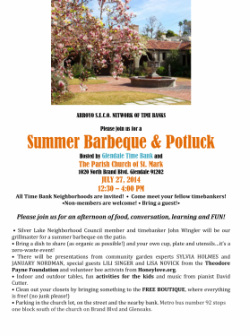 Meet your fellow members and eat some delicious food. Bring your own plate, cup and utensil. Everyone welcome! July 27th, 2014 from 12:30-4 pm St. Mark's Episcopal Church 1020 N. Brand Blvd. Glendale CA 91202 Please join us for an afternoon of food, conversation, learning and FUN! • Silver Lake Neighborhood Council member and timebanker John Wingler will be our grillmaster for a summer barbeque on the patio. • Bring a dish to share (as organic as possible!) and your own cup, plate and utensils…it’s a zero-waste event! • There will be presentations from community garden experts SYLVIA HOLMES and JANUARY NORDMAN, special guests LILI SINGER and LISA NOVICK from the Theodore Payne Foundation and volunteer bee activists from Honeylove.org. • Indoor and outdoor tables, fun activities for the kids and music from pianist David Cutter. • Clean out your closets by bringing something to the FREE BOUTIQUE, where everything is free! (no junk please!) • Parking in the church lot, on the street and the nearby bank. Metro bus number 92 stops one block south of the church on Brand Blvd and Glenoaks. The Louisville TimeBank was featured on ABC News with Diane Sawyer. Watch the story here,
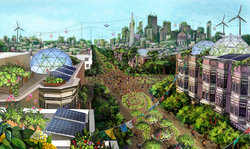 By Sarah McGowan Dear Community Revolving Loan Fund Project Developer Today’s mainstream economy leaves so much to be desired, and undoubtedly its failings are likely one of the many reasons we embrace and value our time banking community as much as we do. Many of us have already come to the conclusion that money can’t buy happiness. And in fact, much research shows that it’s the quality of our relationships, sense of connection and engagement in community, and access to resources that will determine whether we feel like we’re living the life we want instead of the one allowed us by mainstream paradigms and systems. In large part, the extractive economy asks us to bear the hefty burden of its machinations - as laborers making less than a living wage, as hopeful entrepreneurs who believe in the “American dream”, as people saddled with far too much predatory debt in the pursuit of education, happiness and an elusive quality of life. But time bankers are people of great agency and the tool we use to create community – the exchange of our time – is proof alone that by looking through a different lens, we can wrestle a great many beautiful things into being just by turning some of these parasitic systems on their heads. It is in this spirit of innovation that the Community Revolving Loan Fund was created and particularly in partnership with the Permaculture Credit Union. In truth, it would be wonderful to have a local credit union working with us to administer our loan fund, but in our search for a local partner, we were met with blank stares. When asking local banks what they do for the community, we were told, “we give to the United Way.” Though charitable, it’s a strategy that doesn’t directly benefit the community in which they operate. That’s just one example but it says a lot about how little the financial world understands sustainability, community enrichment and human-scale economics. The Permaculture Credit Union not only understands these principles, but is willing to participate in a loan fund for us that quite honestly is peanuts compared to their other programs. They understand why “small is beautiful” (E.F. Schumacher) and how even a small fund can make a very big impact over time if stewarded thoughtfully. This week I’ve been working with the PCU’s president, Bill Sommers, on our Memorandum of Understanding that spells out the roles and responsibilities of our loan fund and their credit union. When I asked if we could have a 60-day grace period between signing and repayment, Bill answered, “yes.” When I asked if we could extend the default period to 120 days, Bill answered “yes.” And when I asked if we’d be allowed to get creative to help a borrower in trouble, Bill answered, “of course – you can design this program however you want.” And that’s the beauty of our particular loan fund – we are building it in a collaborative world of yes’s rather than the usual extractive world of patent no’s. We’ve already done the hard part to give our members access to invaluable resources by leveraging those already present in our community. And by doing so, we’re able to stand together and make many small voices become loudly unified.  All Neighborhood Potluck Hosted by the Echo Park Time Bank on Sat, Nov 16th from 5-7:30PM at Williams Hall at Barlow Hospital in Echo Park 2000 Stadium Way Echo Park, CA 90026 (Between Scott and Elysian Park Ave). Come meet your fellow members and give thanks for your community. Bring your own cup, plate and utensil and a dish to share. 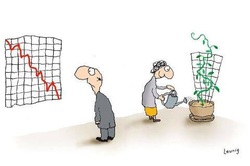 Funding a Better Future for Time Bank Entrepreneurs Sarah McGowan Dear Donate to the Community Revolving Loan Fund! This fall the Community Revolving Loan Fund (CRLF) and Local Economy Incubator (LEI) launched, serving the Arroyo Seco Network of Time Banks (ASNTB). Intended to help our community of artisans, entrepreneurs, visionaries and worker-owned cooperatives gain access to resources that often come with a great price tag in the extractive economy, both new projects seek to educate, support and empower the ASNTB through micro-loans and access to professional development. The CRLF is the first-ever loan fund of its kind to be created by a Time Bank! After receiving a development grant (that also capitalizes 50% of the fund) from the Metabolic Studio, a direct charitable activity of the Annenberg Foundation led by artist and foundation director, Lauren Bon, we’re now in the process of raising $5,000 in matching funds from the community to begin lending in January 2014. Time Bank members are enterprising, resourceful and creative. Many have already launched local businesses, restaurants and worker-owned cooperatives. More of us have developed handmade products such as jams, jewelry, clothing, botanicals and bread. Our fund provides low interest micro-loans to scale up production, upgrade equipment or purchase materials and supplies. Loan requests in the amount of $500-5,000 will be considered through a Time Bank developed application and panel review process. From the incredible support of our financial partner, the Santa Fe Permaculture Credit Union, we will retain full control of the review, management and closing process, offering our entrepreneurs access to truly community-supported small business loans that will further help them either improve or establish their credit. The fund is especially supportive of women and the economically distressed, ventures that promote environmental and/or community sustainability, ventures that show direct and positive impact on the ASNTB community and social entrepreneurs or cooperatives with a social mission. We hope to see today’s borrowers become tomorrow’s mentors and donors. Help us crowdfund this pioneering project! Please consider making a tax-deductible donation today to support our enterprising members! Click here to donate. And click here to learn more about the history of the ASECO Community Revolving Loan Fund and its eligibility requirements, our financial partner, the Santa Fe Permaculture Credit Union, the Local Economy Incubator, our timeline for launch and the ways you can get involved! 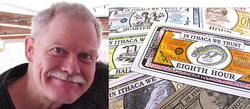 Join us for an exciting event with local currency pioneer, Paul Glover founder of Ithaca HOURS, a successful local paper currency in Ithaca NY. Launched in 1991, Ithaca Hours promote local economic strength and community self-reliance by keeping the wealth circulating within the region. http://www.paulglover.org/ Paul is also author of, Los Angles: A History of the Future. Available for free on-line http://www.issuu.com/metroeco/docs/lahof Originally published in 1982, Los Angeles: A History of the Future envisions a permaculture city that is ecologically stable and locally managed on a human scale. Bio: Paul Glover is founder of 18 organizations and campaigns, including Ithaca HOURS local currency, Citizen Planners of Los Angeles, Health Democracy, the Philadelphia Orchard Project (POP), and the League of Uninsured Voters (LUV). He is author of six books on grassroots economies, and a former professor of urban studies at Temple University. He also consults as Greenplanners. Don’t miss this great opportunity to learn about how we can rebuild the economy together! Date: Sunday, October 6th, 2013 Time: Potluck from 6-7PM talk from 7-8:30PM Location: Armory Center for the Arts 145 North Raymond Avenue Pasadena, California 91103 http://www.armoryarts.org/ Off the Gold Line, Memorial Park stop. Entry: $5 for Time Bank members $10 for non-members. No one will be turned away for lack of funds. Proceeds go towards Paul's travel expenses and the Time Bank Community Revolving Loan Fund. http://www.asntb.com/revolving-loan-fund.html Purchase tickets at the door or at this link: http://paulglover.bpt.me Details: The potluck is a zero waste event. Please bring your own plate, cup and utensil. Carpooling encouraged. Special thanks to The Metabolic Studio, CRSP, The L.A. Eco Village and the Armory Center for the Arts! *Paul will also be speaking at the L.A. Eco Village on Friday, Oct 4th at 7:30PM. http://laecovillage.org/2013/09/12/paul-glover-author-activist-founder-gives-a-public-talk-at-l-a-eco-village-friday-october-4-2013-at-730pm/ 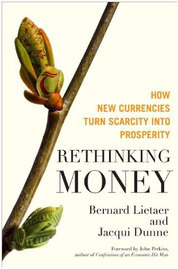 Rethinking Money: How New Currencies Turn Scarcity into Prosperity In this visionary new book, Bernard Lietaer and Jacqui Dunne explore the origins of our current monetary system—built on bank debt and scarcity—revealing the surprising and sometimes shocking ways its unconscious limitations give rise to so many serious problems. But there is hope. The authors present stories of ordinary people and their communities using new money, working in cooperation with national currencies, to strengthen local economies, create work, beautify cities, and provide education—and so much more is possible. These real-world examples are just the tip of the iceberg—over 4,000 cooperative currencies are already in existence. -Maya Gingery |
Arroyo S.E.C.O. Network of Time Banks
News and notes about the sharing economy. Archives
June 2024
Categories
All
|
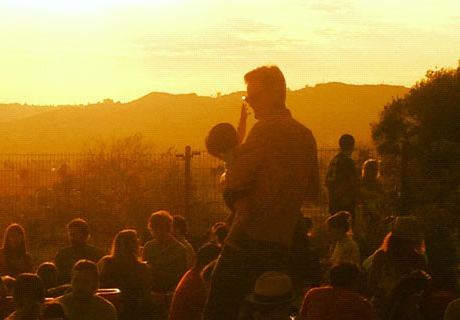
 RSS Feed
RSS Feed
